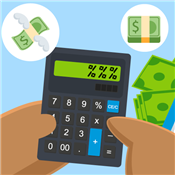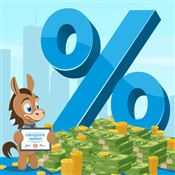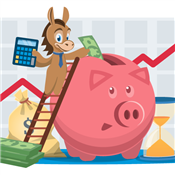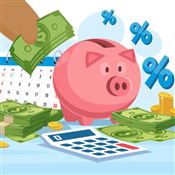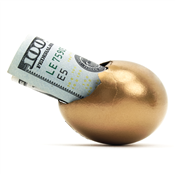How Much Interest Will I Earn on a CD
Ad Disclosure: This article contains references to products from our partners. We may receive compensation if you apply or shop through links in our content. This compensation may impact how and where products appear on this site. You help support CreditDonkey by using our links.
Grow your money risk-free with a CD. Use this free CD calculator to see exactly how much interest you can earn.
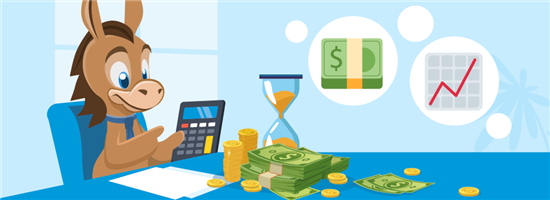 |
If you open a CD today, how much interest would you earn?
This CD calculator shows you how much interest you will earn on the CD. Simply enter the following:
- Investment amount: How much money you will deposit into the CD
- Term: The number of months or years you'll keep your money in the CD
- APY: The annual percentage you expect to earn from your CD
The calculator will calculate how much interest you will have earned by the end of term, and your ending balance.
Ready to grow your savings? Explore the top CD offers below.
- mph.bank:
60-Month Callable CD - 4.32% APY - Dayspring Bank CD Rates:
Up to 4.30% APY - Freedom Bank:
6-Month High-Yield CD - 4.30% APY - Western Alliance Bank:
High-Yield CD Rates - Up to 4.30% APY - Bank Of Utah:
3-Month High-Yield CD - 4.30% APY - Ponce Bank:
3-Month High-Yield CD - 4.25% APY - Always.bank:
3-Month High-Yield CD - 4.25% APY - Sallie Mae Bank:
14-Month No Penalty CD - 4.25% APY - UNCLE Credit Union:
36-Month Callable CD - 4.20% APY - SkyOne Federal Credit Union CD Rates:
Up to 4.15% APY
Western Alliance Bank: High-Yield CD Rates - Up to 4.30% APY
- No fees
- $1 minimum deposit
- FDIC insured
| Term | CD Rates |
|---|---|
| 3 Month | 4.30% APY |
| 5 Month | 4.10% APY |
| 6 Month | 4.30% APY |
| 9 Month | 3.95% APY |
| 12 Month | 3.95% APY |
Consumers Credit Union: 12-Month High-Yield CD - 3.90% APY
- $1 minimum deposit
- No fees
- 24/7 online access to funds
- NCUA insured
SkyOne Federal Credit Union: 12-Month No-Penalty CD - 3.90% APY
- $1 minimum deposit
- 24/7 online access
- Federally insured by NCUA
Keep reading to learn more about CDs, their features, and early withdrawal penalties.
How do CDs Work?
A certificate of deposit (CD) is a type of savings account where you deposit a fixed amount of money for a fixed amount of time. You earn a fixed rate for a specified term.
The term length can range from as short as 1 month to 5 to 10 years. Often times, longer CDs give higher APYs in exchange for the commitment.
If you request to withdraw your money before your CD matures, you'll likely have to pay early withdrawal penalties. This could cost up to several months' worth of interest.
If you need more flexibility, there are special types of CDs that could fit your needs.
- Standard CD: A typical CD with a fixed rate and fixed term.
- Jumbo CD: Usually requires $100,000 minimum. Some jumbo CDs may have higher rates for the big deposit.
- No-Penalty CD: Allows you to withdraw your money early without any withdrawal penalties.
- Bump-Up CD: Lets you increase your rate during the term of the CD.
- Add-On CD: Lets you add more money to your CD during the term.
- IRA CD: For retirement; includes the tax advantages of IRAs.
How do CDs earn interest?
You earn interest on CDs based on four main factors:
- The amount of money (or principal) in the CD
- The interest rate
- The term length
- Compounding frequency
As a rule of thumb, you'd want the highest rate on a CD to maximize your earnings. Of course, the bigger your deposit, the more you'd earn.
One feature that can amplify how much interest you earn is compounding frequency. This is the rate at which your interest is added to your principal. More frequent compounding means faster growth.
For example, if your CD is compounded daily, that means interest is being added to your account everyday. Now the entire new balance will earn interest. This will help you grow faster than if it were just compounded monthly.
Let's look at the effect of compound interest with some examples.
How do you calculate interest on a CD?
The formula to calculate the value of your CD with compound interest is:
A = P(1+r/n)^(nt)
Where:
- A = the total value of your CD at the end of the term
- P = the principal amount deposited when you bought the CD
- r = the annual interest rate in decimal form (ex: if interest is 4.25%, r is 0.0425)
- n = the number of times interest is compounded every year
- t = the number of years until the maturity date
Let's say you had $10,000 in a 5-year CD with an interest rate of 3.5% compounded annually (once a year). The calculation would be:
10,000 (1+0.035 / 1) ^ (1 * 5) = $11,876.86
With annual compounding, you'll get $11,876.86 when it matures in 5 years. But what if it's compounded daily (365x per year)?
10,000 (1+0.035 / 365) ^ (365 * 5) = $11,912.36
If compounded daily, you'll get $11,912.36 at maturity—about $35.50 more than if compounded annually.
Here's a table that shows you the amount you'll get at maturity for the same $10,000 in a 5-year CD with an interest rate of 3.5% compounded at different frequencies:
| Compounding Frequency | n | Amount at maturity |
|---|---|---|
| Annually | 1 | $11,876.86 |
| Quarterly | 4 | $11,903.40 |
| Monthly | 12 | $11,909.43 |
| Daily | 365 | $11,912.36 |
How much does a $10,000 CD earn in a year?
If you had $10,000 in a CD with 3.5% APY, you can earn $350 after one year. How much you earn on a $10,000 CD in a year will depend on its APY.
Here's a table that shows how much your $10,000 CD will earn in different years with varying APY.
| APY | Amount in 1 year | Amount in 3 years | Amount in 5 years |
|---|---|---|---|
| 0.00% | $10,000 | $10,000 | $10,000 |
| 0.50% | $10,050 | $10,151 | $10,253 |
| 1.00% | $10,100 | $10,303 | $10,510 |
| 1.50% | $10,150 | $10,457 | $10,773 |
| 2.00% | $10,200 | $10,612 | $11,041 |
| 2.50% | $10,250 | $10,769 | $11,314 |
| 3.00% | $10,300 | $10,927 | $11,593 |
| 3.50% | $10,350 | $11,087 | $11,877 |
| 4.00% | $10,400 | $11,249 | $12,167 |
| 4.50% | $10,450 | $11,412 | $12,462 |
| 5.00% | $10,500 | $11,576 | $12,763 |
| 5.50% | $10,550 | $11,742 | $13,070 |
A 10-year CD could be worth it if you find a high rate and you don't need your money for the next 10 years. It's best for those saving for retirement or another long-term goal, and can't afford to take risks. You can make some steady passive income with very low risk.
Can you lose money on a CD?
In most cases, you won't lose money on a CD. CDs are considered safe investments because they're covered by federal insurance for up to $250,000. The FDIC or the NCUA will cover your deposits in case your bank or credit union fails.
However, there are some scenarios where you can lose some money on a CD—as rare as they are. Here are some reasons a CD could pose a risk:
Early withdrawal penalties
Withdrawing your CD before maturity will cost you. Some penalties can cost several months or even the full term's worth of interest.
For example, a 6-month CD could have penalties worth 3 months' interest. If you withdraw in 2 months, you'd lose money since the penalty will eat up the interest earned plus a part of your principal.
If you're not sure about committing your money, you could look into no-penalty CDs.
- SkyOne Federal Credit Union:
12-Month No-Penalty CD - 3.90% APY - Mission Valley Bank:
3-Month No-Penalty CD - 4.15% APY - Technology Credit Union:
5-Month No Penalty CD - 4.00% APY - Freedom Bank:
12-Month No-Penalty CD - 3.75% APY - Blue Federal Credit Union:
9-Month No Penalty CD - 3.50% APY - CIT Bank No Penalty CD:
3.50% APY - Sallie Mae Bank:
14-Month No Penalty CD - 4.25% APY - Synchrony Bank:
11-Month No-Penalty CD - 0.25% APY
Interest rate changes
This is also known as interest rate risk. CD rates typically follow the movement of the Fed Funds rate and the Treasury yield. The risk could happen if you locked in a CD rate just before market rates climbed up. If so, you'll have missed out on better rates.
On the flip side, if you get a good CD rate before market rates go down, you would be in a good spot.
Inflation
Inflation can skyrocket. And your money in a CD might not grow fast enough to keep up with the price changes.
How to maximize CD interest earnings?
The straightforward way to maximize CD interest earnings is to get CDs with the highest rates.
Another way to maximize CD interest earnings would be to build a CD ladder. This is a strategy where you split up your money into multiple CDs with different rates and terms.
The idea is to have the CDs mature at regular intervals. That way, you will have cash on hand every time a CD matures. And you can choose to use or reinvest the money into a new CD.
If you want to learn more about building a CD ladder, check out this CD Ladder Calculator and find out how much you can earn.
Usually, if the Fed announces an increase in the Fed Funds rate, you can expect CD rates to increase. But there is no guarantee that CD rates will go up or down. You can make an educated guess by watching out for changes to the Fed Funds rate. Or you can monitor the Interest Rate Statistics published by the U.S. Department of the Treasury.
Compare CD Rates
High-Yield CD Rates - Up to 4.30% APY
- No fees
- $1 minimum deposit
- FDIC insured
| Term | CD Rates |
|---|---|
| 3 Month | 4.30% APY |
| 5 Month | 4.10% APY |
| 6 Month | 4.30% APY |
| 9 Month | 3.95% APY |
| 12 Month | 3.95% APY |
12-Month High-Yield CD - 3.90% APY
- $1 minimum deposit
- No fees
- 24/7 online access to funds
- NCUA insured
12-Month No-Penalty CD - 3.90% APY
- $1 minimum deposit
- 24/7 online access
- Federally insured by NCUA
Certificate of Deposit
- 4.00% APY for 12-month term
- 3.80% APY for 18-month term
- 3.80% APY for 24-month term
- 3.50% APY for 36-month term
- 3.50% APY for 5-year term
CIT Bank Term CDs - Up to 3.50% APY
- Up to 3.50% APY
- $1,000 minimum opening deposit
- No monthly maintenance fee
- Member FDIC
| Term | CD Rates |
|---|---|
| 6 Month | 3.00% APY |
| 1 Year | 0.30% APY |
| 13 Month | 3.50% APY |
| 18 Month | 3.00% APY |
| 2 Year | 0.40% APY |
| 3 Year | 0.40% APY |
| 4 Year | 0.50% APY |
| 5 Year | 0.50% APY |
12-Month High-Yield CD - 4.00% APY
- $1 minimum deposit
- No fees
- 24/7 online access to funds
- Federally insured by NCUA
5-Month No Penalty CD - 4.00% APY
- $1 minimum deposit
- No fees
- Deposits federally insured up to at least $250,000 by NCUA
12-Month No-Penalty CD - 3.75% APY
- $1 minimum deposit
- No fees
- 24/7 online access to funds
- FDIC insured
15-Month High-Yield CD - 3.55% APY
- No fees
- $1 minimum deposit
- 24/7 online access to funds
- Federally insured by NCUA
CD Rates - Up to 3.75% APY
- $500 minimum opening deposit
- FDIC insured
| Term | CD Rates |
|---|---|
| 6 Month | 3.75% APY |
| 12 Month | 3.25% APY |
| 24 Month | 3.35% APY |
| 36 Month | 3.25% APY |
| 60 Month | 3.00% APY |
Alternatives to CDs
If you're not sure if a CD account is for you, consider these alternatives:
- High-Yield Savings: You can manage your funds online and earn a good rate. High yield savings accounts are perfect for short-term goals and emergencies.
- Money Market Accounts: These are like savings accounts, but many money market accounts allow for more flexible access to your money with a debit card and check writing privileges.
- Treasury Securities: Treasury bills, notes, and bonds have competitive rates and are backed by the government, making them reliable options for investment.
- Dividend Stocks: Buy stocks of big and reputable companies for consistent income and the potential for higher returns.
- Corporate Bonds: Other than stocks, you can buy bonds from well-established corporations that have stable plans for long-term expansion.
CDs can be worth it if you can lock in a high interest rate and don't need the money. Getting a CD when rates are high can help you maximize interest earnings and provide a stable passive income source.
Bottom Line
The CD calculator should be able to help you if you're shopping for CDs and you want to see how much interest you can earn. You'll want to get the highest CD rates if you want to maximize your interest earnings.
Ultimately, choose a CD that best fits your plans and circumstances. Weigh your options carefully, since you won't be able to touch your money for some time.
Write to Rue Atanacio at feedback@creditdonkey.com. Follow us on Twitter and Facebook for our latest posts.
Note: This website is made possible through financial relationships with some of the products and services mentioned on this site. We may receive compensation if you shop through links in our content. You do not have to use our links, but you help support CreditDonkey if you do.
|
|
| ||||||
|
|
|










